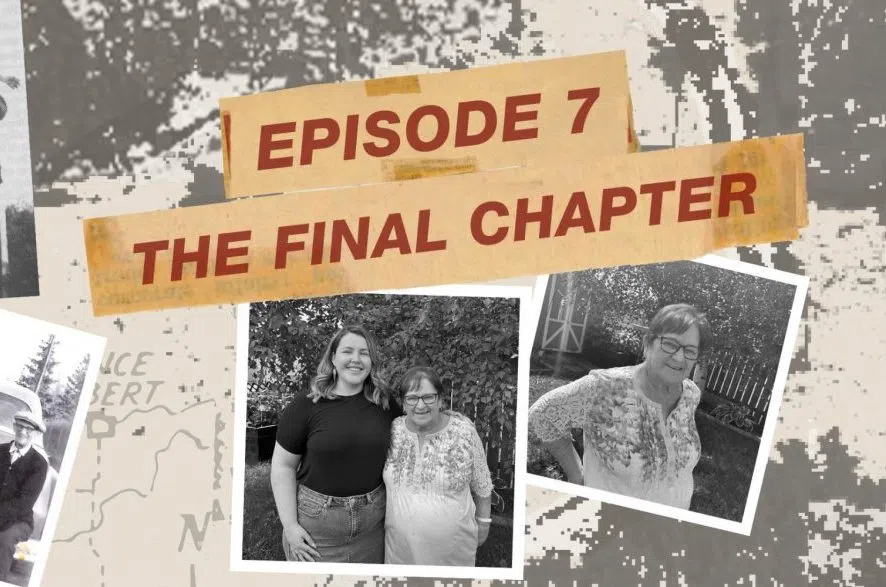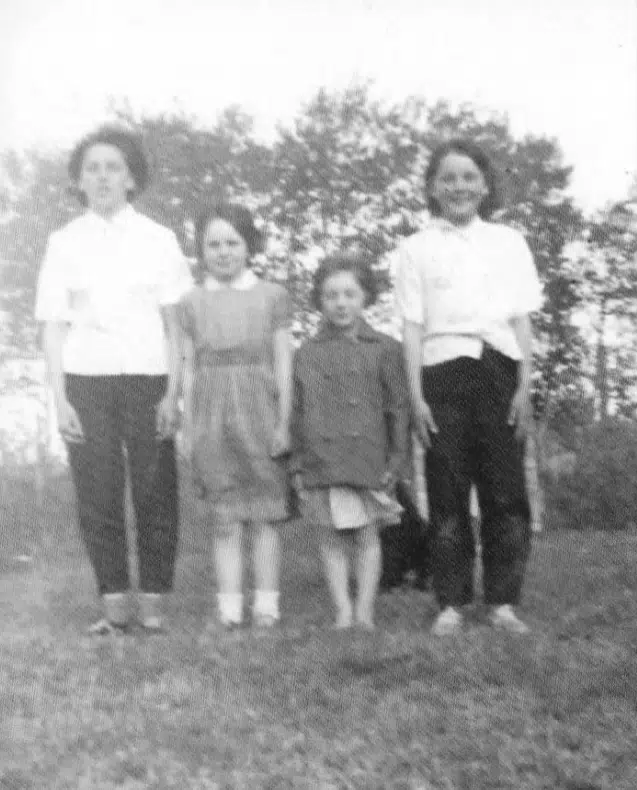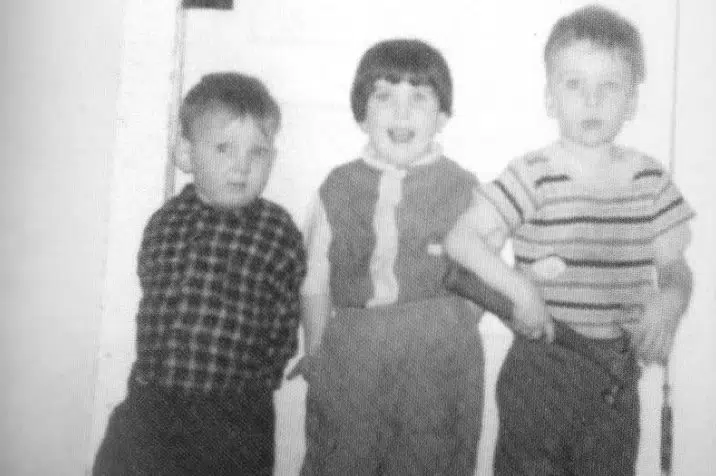Spiritwood, Sask. — Kathy Hill’s four children didn’t know the full details of the tragedy that overshadowed her earlier life until The Shell Lake Massacre podcast debuted last August.
“Now, my family might be remembered,” Hill, 76, told host Brittany Caffet in a bonus episode that aired Thursday.
While the process of recounting the details of one of Canada’s worst random mass murders stirred up many uncomfortable emotions for Hill, she said she doesn’t regret the experience. In fact, she said fun-loving memories from her childhood have resurfaced since revisiting the tale.
“I remember playing outside, having a ball game with them… we’d go berry picking. I just remember them all as they were when I was at home with them,” she said of her seven siblings who died at the hands of Victor Ernest Hoffman.
Caffet met with Hill at her home in Spiritwood to reflect on the impact of the six-part series.
Listen to Episode 7: The Final Chapter
Transcript of Episode 7: The Final Chapter
Disclaimer: Most of the following transcription is AI generated, and errors may have occurred.
One year ago, I shared the story of the Peterson family with you.
The Shell Lake Massacre was a story about their death, but it was also a story about their life.
I grew up hearing ghost stories about the Petersons and the horrifying mass murder that left nine members of the family dead.
But as I began working on this project, my view on the family shifted.
Sitting with Kathy Hill as she recounted stories of her parents and siblings took them from these abstract victims and turned them back into living, breathing people in my mind.
As we once again approached the anniversary of the Petersons’ deaths, I knew exactly who I wanted to spend some more time with.
Brittany Caffet: Hey Aunty! How are you?
Kathy Hill: Good, and you?
Brittany Caffet: Good! Back at it again. Look at us — one year later.
This is the Shell Lake Massacre.
You’re listening to Episode 7 – The Final Chapter
I’m your host, Brittany Caffet.
As I made the hour-and-a-half long drive to Kathy Hill’s home in Spiritwood, a nervous knot arose in my stomach.
I felt almost as anxious as I did before we initially sat down to start work on the podcast.
A whole year has passed since the first episode of the series was released, but somehow it doesn’t feel any easier or less uncomfortable to speak with Kathy about the tragedy that has overshadowed most of her life.
But we both agreed that there were still some questions lingering in the air surrounding the process of creating the podcast, and that it was time to answer them and turn the page on this chapter of the Petersons’ story.
She poured me a cup of coffee before we sat down together at her kitchen table and spoke about The Shell Lake Massacre for the final time.
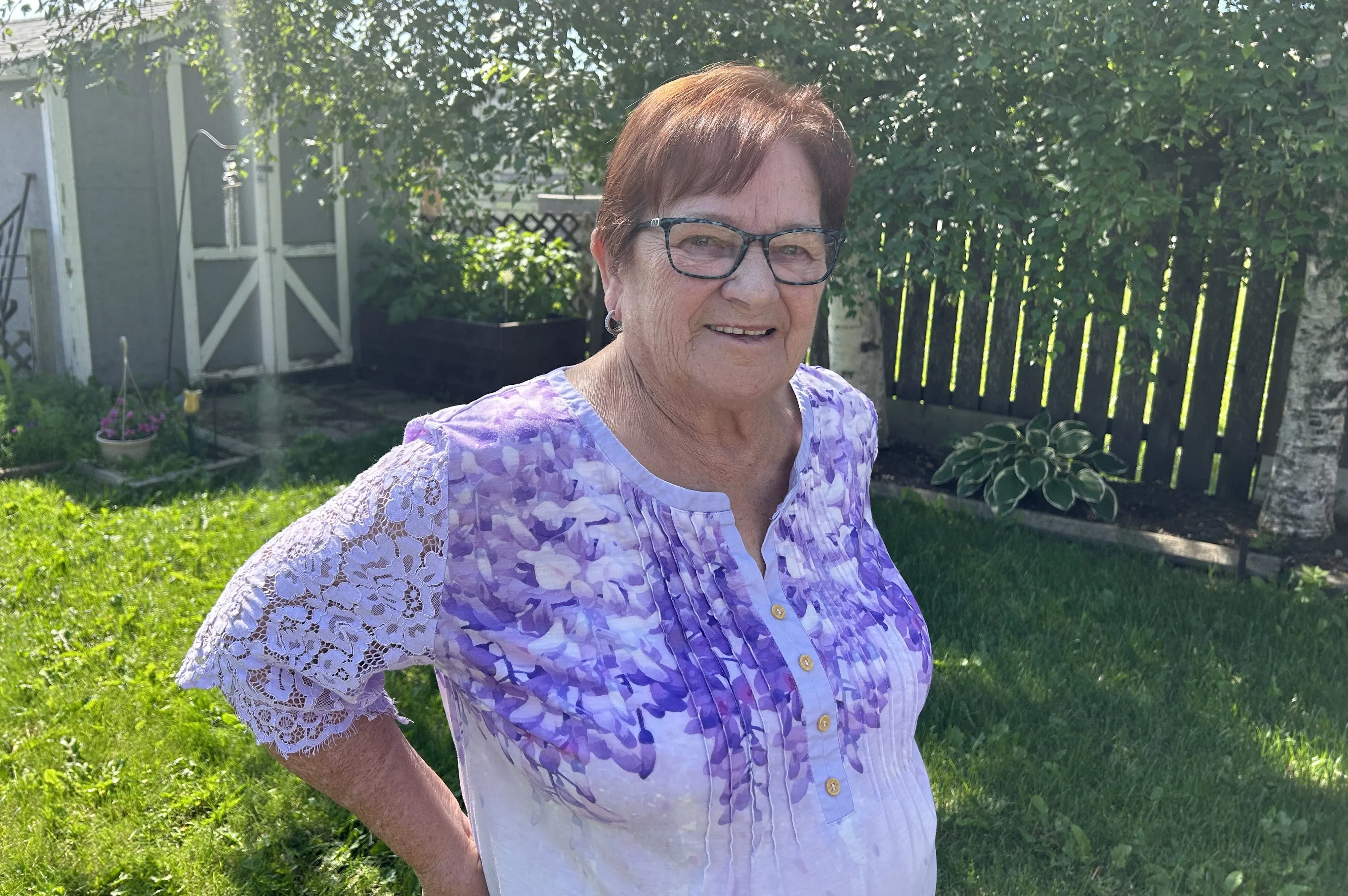
Kathy Hill is the only surviving member of the Peterson family. She said that opening up about her family during interviews for The Shell Lake Massacre podcast was a healing experience. (Brittany Caffet/650 CKOM)
Brittany Caffet: It would have been early in 2023 when I called you out of the blue and asked if I could interview you about your family. Do you remember what you thought?
Kathy Hill: Yeah. I don’t know as I thought that much of it, but now, when I think back, I’m thinking, okay, this is a good thing. Because now my family might be remembered.
Did you have any hesitation or nerves at all when I first asked if we could do this together?
No, I don’t think so. I think actually I felt like it was maybe a good thing to get it all out there and have people know them again.
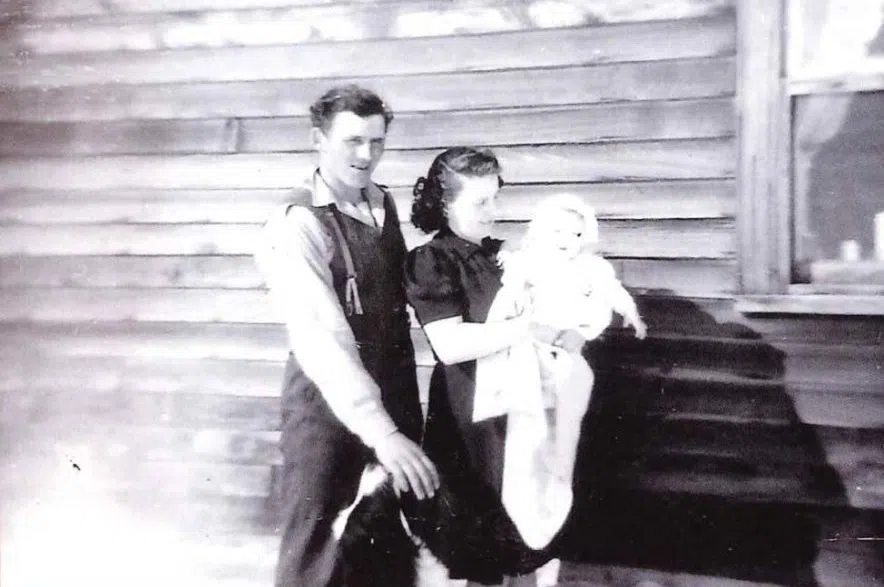
Kathy Hill was Jim and Evelyn Peterson’s first child. She was born in September 1947, just two weeks before the couple celebrated their first wedding anniversary. (Kathy Hill/Submitted)
Growing up in this area near Shell Lake, it was always a story that I had heard about. But all I really knew about your family was that they were the victims of this horrible crime. I kind of had all of these questions in the back of my mind about the people that they were… you’re sort of the last person that has the answer to those questions.
Yeah. And like even my kids don’t know any of them. You know, anybody that’s younger than I am really didn’t know anything about them. And now most of them that did know are gone. My aunts and uncles are all gone. And I’m losing cousins every year now.
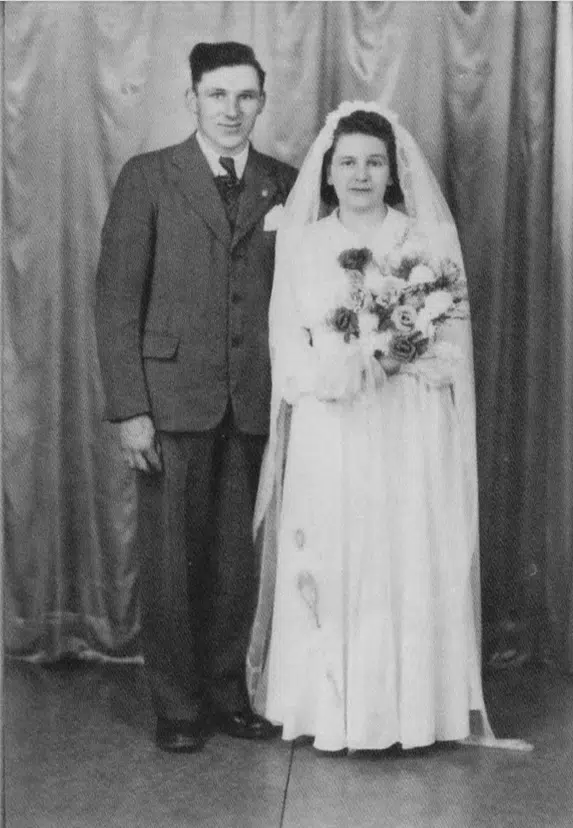
A wedding photo of Jim and Evelyn Peterson. The couple went on to raise nine children on a farm near Shell Lake, SK. (Kathy Hill/Submitted)
As we kind of started delving into the story of your family, what was that like for you to kind of open up about them?
Well, yeah, it kind of brought back a lot of nasty memories, but at the same time it was not really a bad thing.
As we were talking you mentioned that a lot of memories about your family you had kind of suppressed. Pushed down. You hadn’t thought about them, because every time you thought about them these negative things would come up. Have you been able to have any good memories also come back?
Oh yeah. I remember playing outside and having a ball game with them and those kind of things… we’d go berry picking. I just remembered them all as they were when I was at home with them. Fun loving. We’d fight and make up and… There’s just so many things that they missed out on, and I missed out on. But life goes on.
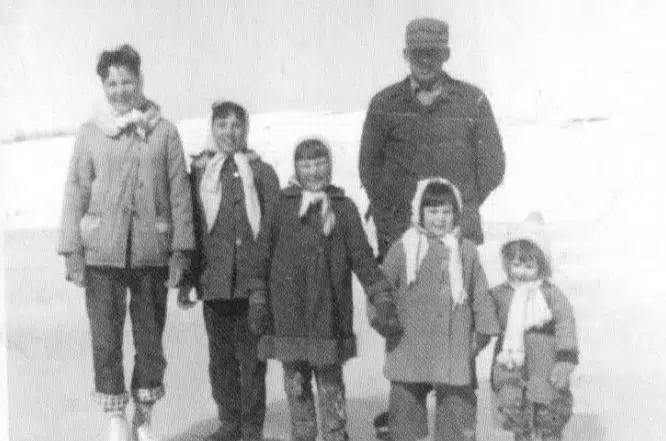
Siblings Kathy, Jean, Mary, Dorothy and Pearl Peterson enjoy a winter outing on the ice with their father, Jim Peterson. (Kathy Hill/Submitted)
Before the first episode came out, I was pretty nervous as to what the reaction from people in our home community would be. I had a few people that were kind of like “Well, why would you bring this up now? Why would you dive back into this?” What are your thoughts on that question of “Why now?”
It wasn’t a bad thing. I’ve had quite a few people reach out to me and say “Well I know you, and I knew you, but I never knew what you went through.” Or “I’d heard about it, but I didn’t know it was your family.” A lot of the neighbours texted me or got a hold of me. And I’d never, ever thought about how it affected them. Like, our closest neighbour was right across the road, and those kids had to see that house every day. And I know Linda said it was hard riding the school bus, because they had to go right by.
I think there was this group of people waiting with bated breath to hear what that first episode was going to be like. You had already heard it, thankfully, because before any of the episodes came out I came and I sat down with you and we listened to the first episode and the last episode together. What was that experience for you like — us sitting at this same table and listening to those two back-to-back?
It was good, really. Better probably than hearing it when I’m alone. Because a lot of it, I didn’t… I don’t know, it just never really sunk in. And now it seems like the order I get, the more it does.
For the rest of the episodes, were you just by yourself listening?
Most of the time, yes. Some of the time, Linda was here. There was a lot of things that I didn’t know because everybody tried to keep hiding it. You know, they don’t want to… didn’t want to bring it up. So there was a lot that I didn’t find out at the time.
What were some of the details or things that you didn’t know at the time that you were able to learn from the podcast?
Mostly how they found him and those kind of things. I know the RCMP worked very hard and they were really good.
Pretty early in the process, when we were first starting to talk about this, I had reached out to the RCMP and then reached out to some archives to try and get that RCMP file and I had kind of hit a dead end. I wasn’t hearing back we were waiting for approval because there was really sensitive information in that case file, so they needed some special approval to give it to me. And by the time we launched on August 15th of last year, I still did not have that case file in my possession. And I think it was two days after that first episode came out, they decided to let me have it. So I’m kind of curious as to whether perhaps someone listened and decided that this was a good opportunity for the details in that file to come out. I was honestly really impressed at the detailed police work that was really done.
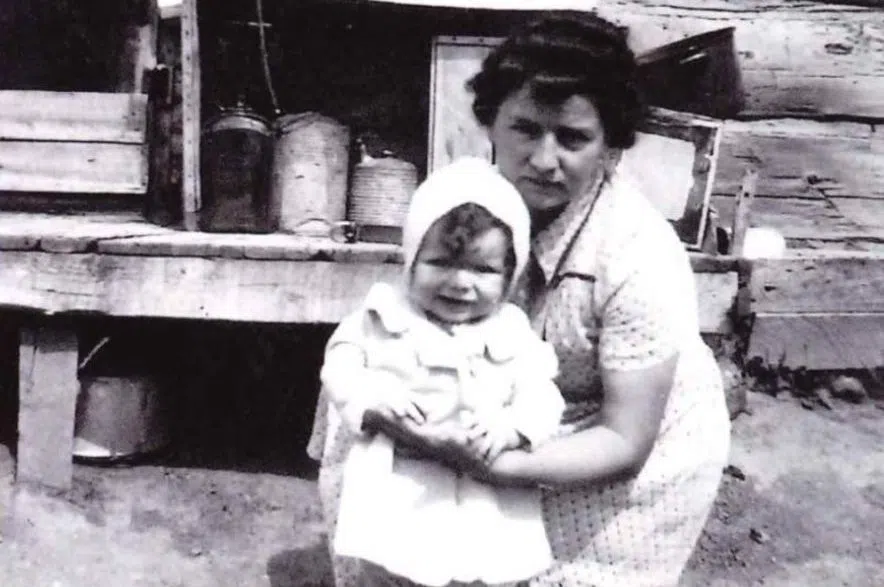
Kathy Hill remembers her mom Evelyn Peterson as a soft spoken and very gentle person. With 9 kids at home, Evelyn treasured the little quiet time she managed to make for herself each day while milking the cows. (Kathy Hill/Submitted)
I think there was some concern that this would be a piece of work that really set out to sensationalize this story. What are your thoughts on how this story kind of played out?
I think it was really good, and I have had a lot of people say that too. Like it was good to just hear how everything was and… maybe as information rather than all the gory details.
As I was going through things and especially once I got that police file, one of the things that was always in the back of my mind was the dignity of your parents and of your siblings. And as I worked through all of those details, the thing that was always in the back of my mind was “is this information going to keep the dignity of the Peterson’s intact?” It can be easy to get caught up in the gory details that make you kind of like catch your breath when you hear them. But there is so much more… your parents weren’t just victims. They were whole people. And I think that was an important part of this story that we tried to tell together.
I’m curious what your experience was like with reporters and with the media in the early days, right after all of this happened.
Oh, it was horrible. You know, you’d get… one of them would want you to tell a story, but none of it was ever written down right. It was all their idea. And I know there was a couple of times when we’d go back to Lee’s mom’s, and there was somebody standing there with their heads stuffed in the window of the vehicle before you could even get out. Then, well, the RCMP actually put someone in the house to stay with us.
Do you think your initial treatment from the media and from reporters is part of why you were so hesitant to share your story for so long?
I think that’s a lot of it, yes. Because they’d write it down, but it was never really what I would say or feeling or anything else.
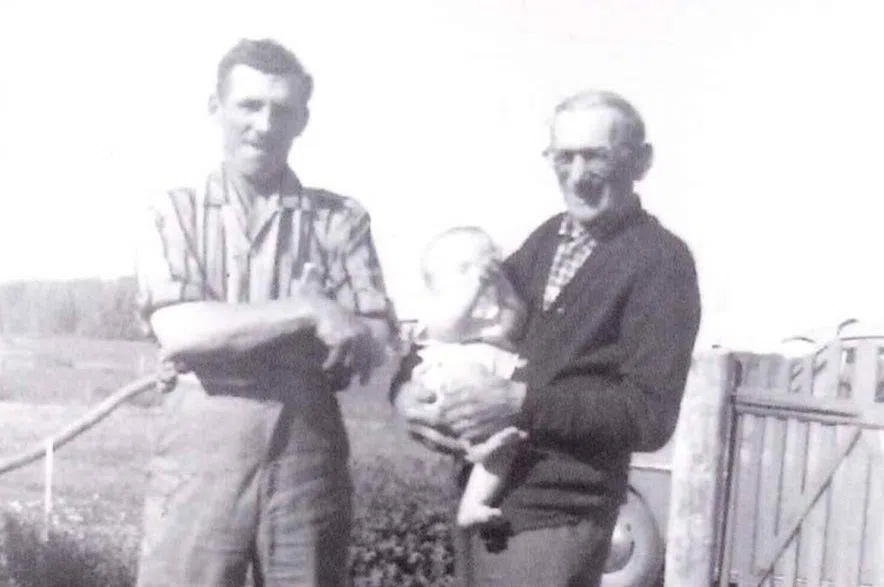
Kathy Hill was 14 years old when William, Jim and Evelyn’s first son, was born. “We had to come to town so he could phone the hospital to find out whether the baby was born or not,” she recalled. “All I remember hearing was him yelling ‘A BOY!’ and just screaming… he was very excited.” (Kathy Hill/Submitted)
So then what in the world made you agree to my random phone call being like “Hey, you want to do this?”
Well, because I knew you. And you’re family, and I guess that’s the big thing.
What was it like for your kids to listen to this?
Not too bad really. They found out a lot of things they didn’t know, but I think it was… all together it worked out okay. They were happy.
We all got together for Thanksgiving last year, which was nice. Because it’s been a long time since our family had all gotten together. So it was kind of nice that this piece of work was something that like brought us together as a family again. But I found it interesting as we were all kind of sitting around, I could sense that it was kind of like this elephant in the room. Everyone sort of wanted to talk about it, but no one wanted to bring it up. I find it really interesting that there is still this layer of… you know, we’re not quite comfortable enough to talk about it yet. Do you think that will ever go away?
I don’t think so. I know a lot of the kids that I went to school with, they just don’t talk. They don’t even come up and talk to me. I’ve had one that did, but for the most part they just don’t mention it.
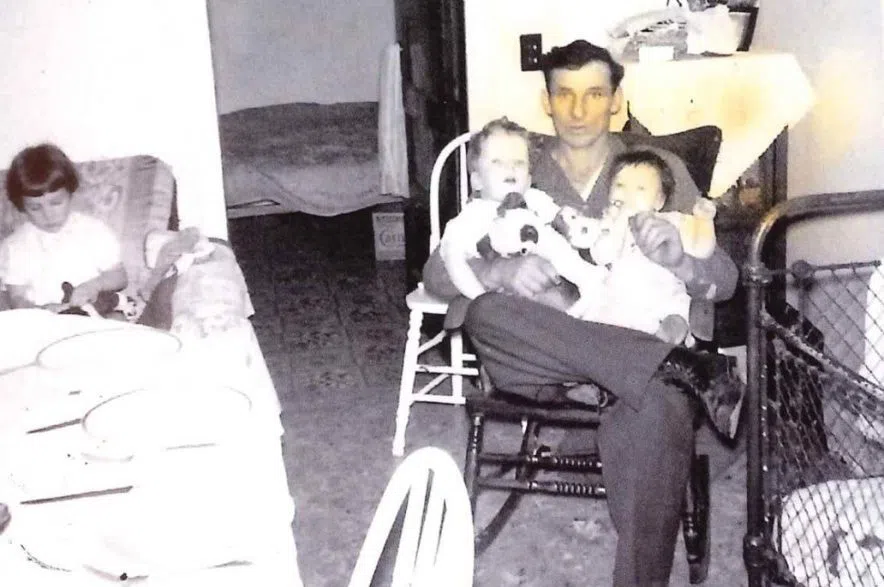
Jim and Evelyn Peterson lived with their nine children in a small two-bedroom home near Shell Lake, Saskatchewan. Kathy Hill says that growing up in a house full of so many kids was chaotic, but in the very best way. (Kathy Hill/Submitted)
Do you prefer if people just don’t mention it?
Most of their time, yes. It’s just easier.
It’s easier, but I do find it interesting that through this process — and I know the Simonars have said the same thing — that kind of sitting down and unpacking everything and just laying it all out on the table… It seemed to be in some way like this kind of cathartic, healing experience. So what was that like for you?
It was good. You know, just get everything out there and let people know that… I’m still here.
I’ve always thought you were a great person and I’ve always respected you. But hearing your story and everything that you have gone through and the way you have continued to live your life through all of that… I’ve been truly inspired by you, Aunty. And I know that a lot of people that I’ve talked to about the podcast say the same thing.
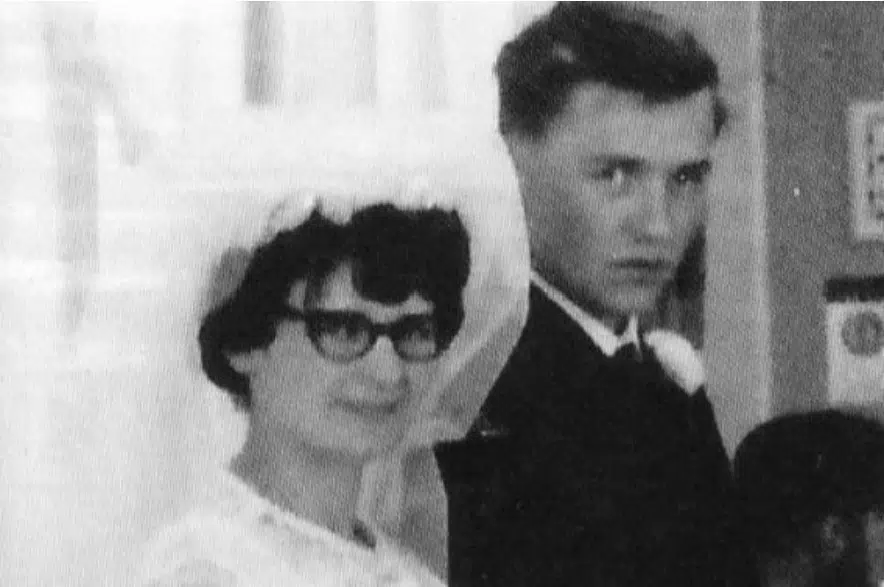
Kathy Hill was only 19 years old when she married and left home. Less than a month later, she bravely navigated the loss of her parents and seven of her siblings. (Kathy Hill/Submitted)
Everybody wants to be remembered. That’s kind of what everyone’s hope is, that once they’re gone, they’ll be remembered — and hopefully for something good. I think for a long time with your parents and your siblings, they were remembered as victims. For me, now when I think of Jim Peterson, I think of this guy who had a bit of a temper, but was so loving and patient with his kids. And I think about your mom and I think about a woman who was exhausted raising all of these kids and would go to milk the cows for some quiet time. And, you know, with each of your siblings, I think about these aspects of their personality that you’ve told me about. Like how William was so mischievous, and Jean was so athletic and loved to be outside. It’s been such a gift for me, Aunty, to get to know your family through you. And what a legacy you have created for them. Because to me, and to everyone who has listened to this podcast, they’re not just victims anymore.
How do you hope people remember your family?
Well, as a huge farming family that lived at one point.
So more than just their death… remembering that they lived.
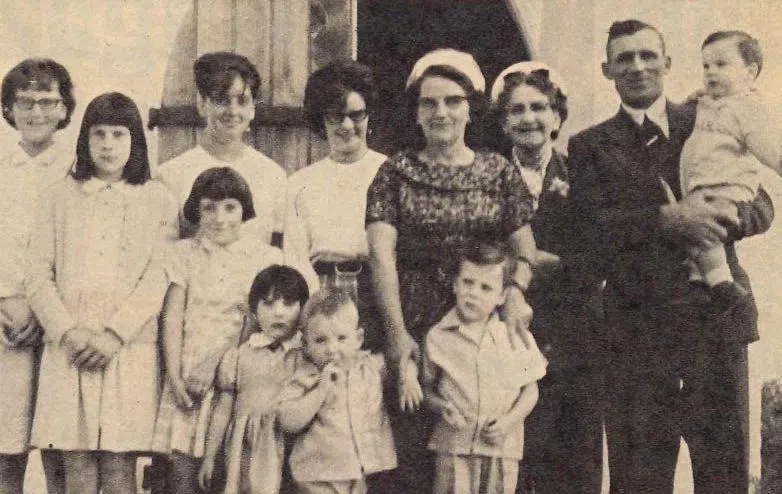
Kathy Hill says she wants her parents and siblings to be remembered “as a huge farming family that lived at one point” — not just as the victims of a horrific crime. (Kathy Hill/Submitted)
Credits
The Shell Lake Massacre is a Rawlco Radio production. The show was researched, written, produced and hosted by Brittany Caffet.
Supervising producers Ashley Trask, Sarah Mills and Murray Wood. Story consultant Craig Silliphant. Production support by Dallas Doell and Shelby Emro. Graphic design by Jennifer Losie. Special thanks to Erin McNutt and John Gormley.
